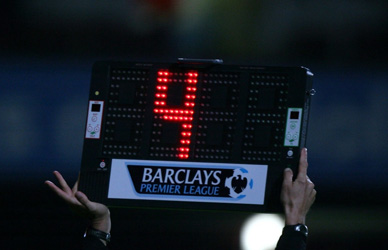We’ve all got used to the injury time board these days – “There will be a minimum of X minutes time added by the official” or however the PA man announces it. It often strikes me how close the final whistle is to exactly the number of minutes shown on the board. No extra 20 / 30 / 40 / 50 seconds – which by the law of averages there should be, given injuries, goal celebrations, substitutions and other delays vary in length and will rarely tally up to exactly a round minute.
Introduced, initially in Italy’s Serie A in the early 2000s, at least it gives an element of certainty about how much time is left. I recall a game early in the 1988-89 season at home to Southampton when the referee added on an inordinate amount of time – it is referred to in these brief highlights by commentator Martin Tyler. Arsenal were 2-1 down, but the referee seemed to let play continue until they equalised. It was estimated to be around six or seven minutes from memory. For Manchester United, this later became known as ‘Fergie Time’. However, without that point, the Gunners’ legendary finish to that season at Anfield might not have happened at all.
Speaking of which, remember Steve ‘one minute’ McMahon in that game at Liverpool a few months later. He asked the ref how long was left, but a lot longer was added, allowing Micky Thomas to score, and even after that, the ref, maybe out of a sense of guilt, gave Liverpool time to mount a further attack. I wonder if, were the current system in operation, that game might have ended before John Lukic rolled the ball out to Lee Dixon, and the title gone to Liverpool.
On such small margins can trophies sometimes be determined. The system is certainly less prone to abuse or bias now, although even the decision about how long to add is a subjective one. A referee might get away with adding an extra minute when he informs the fourth official what to put on the board, and even then, the “three minutes minimum added time” can be stretched to three minutes 55 seconds, or even longer if there are further stoppages such as substitutions or injuries after the 90 minutes.
One thing that irks me about the modern game is tactical time-wasting, and yes, I accept that the idea of the 90 minutes is part of football folklore. But remember, VAR is already in operation in other leagues, and will soon be arriving in England (and has already been used in certain cup competitions). There is no way they are going to add on all the time that VAR eats up if referees are going to consult a monitor at pitchside. I think the time has come for basketball style timing. When the ball is dead, the clock stops. Then the time delaying tactics will be for the most part pointless, only serving to break up the rhythm of the game, but not actually reducing the amount of time the opposition have to score. It will mean a game becomes a 60 minute (of actual play) affair, and to avoid moments like the legendary Clive ‘Bookie’ Thomas blowing up a second before the ball is in the net at the 1978 World Cup, at the end of every half, the ball would have to go out of play (not dead, the winning team would simply commit a foul to secure victory) once the time allotted for each half is completed, as happens in rugby union. That in itself could lead to some great drama.
Food for thought anyway as we begin another international break. The Gooner daily is planned to continue in the absence of Arsenal matches, although as I’ve said before, anyone that wishes to write for the website is more than welcome!
Final piece of housekeeping – the October Gooner podcast is recording this evening. Tweet your questions / topics to @GoonerPodcast, email them to goonerpodcast@gmail.com or leave them in the comments below.








